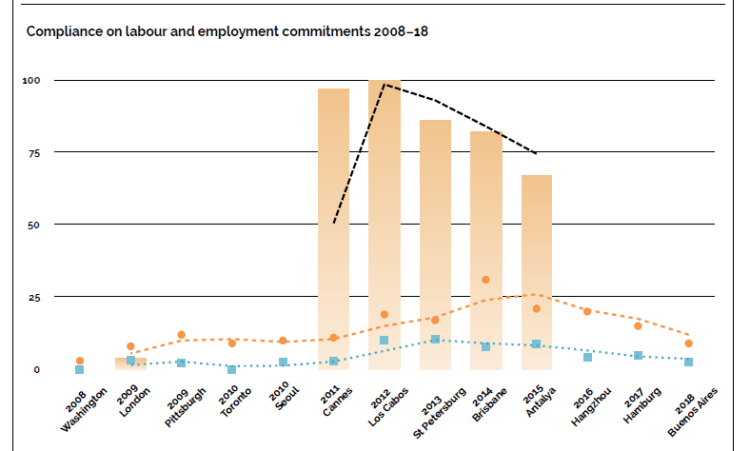Challenge
Proposal
As host of the G20’s Osaka Summit, Japan ranked advancing innovation in technology and science to solve complex social issues as one of its top three priorities. Given that the future of work has become so enmeshed with the digital revolution, this human-centred priority is closely related to labour and employment – signalling an increased focus on this subject.
Conclusions
At G20 summits, labour and employment have been addressed in a broad way that includes labour markets, mobility and standards, occupational safety, offshore outsourcing and national wage-setting systems. Since 2008, in their concluding communiqués, G20 summits have averaged 2,173 words on labour and employment or 14% of the total words at each summit.
Commitments
Since the first G20 summit in 2008 through to 2018, the leaders made 129 commitments on labour and employment. This is about 5% of the 2,582 commitments they made overall.
Their first commitments on labour and employment were the four made at the 2009 London Summit, followed by three at Pittsburgh later that year. There were none at Toronto in 2010, but four at Seoul later in 2010. The number gradually began increase at the 2011 Cannes Summit, with eight. Los Cabos in 2012 made 18.
The peak of 29 commitments came at St Petersburg in 2013. A decline followed at Brisbane in 2014 with 16, to 10 at Antalya in 2015 and nine at Hangzhou in 2016. The 2017 Hamburg Summit spiked to 25. In Buenos Aires in 2018, the future of work in the age of the digital revolution was a top priority; nonetheless, only three commitments on labour and employment were made.
Compliance
The G20 Research Group has assessed 16 of the 129 commitments on labour and employment for compliance by G20 members. Compliance averaged 75%. This is a little higher than the G20’s average compliance across all issues of 71%.
The lowest compliance came from London, where the G20’s commitment on building fair and family-friendly labour markets scored only 4%.
Compliance peaked at 100% with the commitment on fostering job creation made at the 2012 Los Cabos Summit. High compliance also came at Cannes in 2011 at 97%, with its commitment on creating a more equitable work environment. Compliance on the six assessed commitments from St Petersburg in 2013 averaged 86%.
Since then, compliance generally decreased. The 2014 Brisbane Summit averaged 82%. At Antalya in 2015, the four commitments on integrating youth into the employment market and monitoring the implementation of the 2015 Employment Plan averaged 67%.

Corrections
Although global unemployment is projected to fall from its 5.3% rate in 2018, the G20 still needs to improve its performance on labour and employment, especially on compliance with its commitments. It can do so in three ways.
First, the G20 should make more commitments on labour and employment. Indeed, the more commitments made at a G20 summit on labour and employment, the higher the compliance with them. The three summits that made the most commitments on this subject (St Petersburg, Los Cabos and Brisbane) had the highest compliance scores. Their 85 total commitments averaged compliance of 89%. Conversely, the summits with the fewest such commitments (Antalya, Cannes and London) averaged compliance of a modest 63%.
Second, labour and employment ministers should continue their tradition of meeting during the summit year, as they have since 2010. Since then, both commitments and compliance on this subject have increased.
Third, compliance could be strengthened by embedding specific compliance catalysts in the commitment, to provide direction for implementation. Specifically, they could place labour and employment commitments at the beginning of the communiqué, incorporate a completion timeline of one year or less, and include explicit references to the core related international organisation, namely the International Labour Organization.
The views and opinions expressed in this article are those of the authors and do not necessarily reflect the views of the Global Solutions Initiative. This article was originally published in G20 Japan: The 2019 Osaka Summit by GT Media Group and the G20 Research Group, 2019. View the original article.








